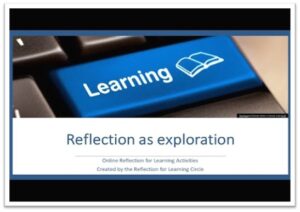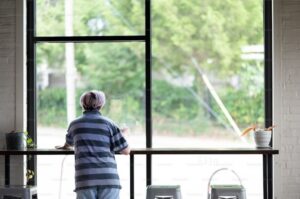By Honorary Associate Professor Anne-Louise Semple, PhD, Macquarie University and Associate Professor Kate Lloyd, PhD, Macquarie University
This is the fifth post in the Reflection for learning develops metacognition series.
The aim of this series is to support educators and learners with their reflective practice as a foundational skill in developing metacognition.
The blogs in the series each focus on a different mode of reflection, with the aim of introducing a spectrum of approaches to reflective practice spanning analytical,
personalistic, critical, and creative. Each blog provides the scholarship underpinning the practice and shares a reflective activity to engage readers experientially.
There are many meaningful ways to engage with, and practice, reflection and a focus of this series is engaging the reader in a range of experiential activities.
The authors of this series are members of the Reflection for Learning circle. We have experimented, practiced and researched Reflection for Learning for over ten years.
The question
This post asks: How can your surrounding environment support reflection?
Reflection and Metacognition
Metacognitive skills involve awareness of what has been learned or needs clarification, and the way you learn (Stanton et al., 2021). Awareness of and reflection on one’s surrounding environment, and one’s place within that, can enhance knowledge and understanding in ways that support metacognition.
Studies on field-based and experiential learning demonstrate the significance that reflection on one’s place/surrounds/environment can have including: increased self-awareness, ability to relate theory to real world practice, and the articulation of learning (Fedesco et al., 2020; Lloyd et al., 2015). Indeed, spending time in nature is known to enhance creativity, critical thinking, problem solving, and it improves attention and focus; it is restorative (Taylor & Kuo, 2008; Rios & Brewer, 2014).
Our experiences during COVID revealed, however, that we can adapt reflection to any environment, be it indoor or out. Encouraging reflection on and in your surrounding environment, wherever you may be, supports mindful awareness and in turn contributes to “implicit knowledge in association with explicit knowledge, and insight into others’ perceptions” (Bolton, 2010, p. 15).
Therefore, taking time to explore your surrounding environment in detail, and your experience of that, can enhance our connection to that place and create new ways of seeing, thinking, doing and being. (See the Reflection as Exploration video.) This self-awareness, which draws on both the physical and physiological, contributes to metacognition as individuals gain an enhanced ability to understand how different things and their location are interconnected, including in relation to themselves (Stolz, 2015; Leigh & Bailey, 2013).
What does this look like in practice?
Whether a place is familiar or unfamiliar, whether you are in the classroom or outside in nature, the mission is simple: start by slowing down and taking time to notice things in your surrounding environment that previously might not have been apparent. “Everything is interesting. Look closer…alter your course…notice patterns…trace things back to their origins…” (Smith, 2008, p.5).
Photo by Nathan Anderson on Unsplash
Document your observations in a way that suits you: use a camera, art supplies, pen and paper, laptop or audio recorder to document an object, a feeling encountered during the exploration, an experience that unexpectedly occurs, or a sense of something that evolves as a result of your exploration.
How can I learn more?
For more information, and to discover other practices including one that engages all five senses as one experiences their surrounding environment, please see our reflection for learning scholarly practice guide.
The online Reflection for Learning video series provides further demonstration:
References
Bolton, G. (2010). Reflective practice: Writing and professional development (3rd ed.). Sage.
Fedesco, H. N., Cavin, D., & Henares, R. (2020). Field-based learning in higher education: exploring the benefits and possibilities. Journal of the Scholarship of Learning and Teaching, 20 (1), 65-84. doi: 10.14434/josotl.v20i1.24877
Harvey M., Lloyd K., McLachlan K., Semple A-L., & Walkerden G. (2020). Reflection for learning: a scholarly practice guide for educators. AdvanceHE. https://www.advance-he.ac.uk/knowledge-hub/reflection-learning-scholarly-practice-guide-educators
Leigh, J., & Bailey, R. (2013). Reflection, reflective practice and embodied reflective practice. Body, Movement and Dance in Psychotherapy: An International Journal for Theory, Research and Practice, 8(3), 160-171. doi: 10.1080/17432979.2013.797498
Lloyd, K., Howitt, R., Bilous, R., Clark, L., Dowling, R., Fagan, R., Fuller, S., Hammersley, L., Houston, D., McGregor, A., McLean, J., Miller, F., Ruming, K., Semple, A-L., & Suchet-Pearson, S. (2015). Geographic contributions to institutional curriculum reform in Australia: the challenge of embedding field-based learning. Journal of Geography in Higher Education, 39(4), 491-503. doi:10.1080/03098265.2015.1103710
Rios, J.M., & Brewer, J., (2014). Outdoor education and science achievement. Applied Environmental Education & Communication, 13(4), 234-240. http://dx.doi.org/10.1080/1533015X.2015.975084
Smith, K. (2008). How to be an explorer of the world. Portable Life Museum. Penguin Group.
Stanton, J.D., Sebesta, A., J., & Dunlosky, J. (2021). Fostering Metacognition to Support Student Learning and Performance. CBE Life Sciences Education, 20(2), 1-7. doi: 10.1187/cbe.20-12-0289
Stolz, S.A. (2015). Embodied learning. Educational Philosophy and Theory, 47(5), 474-487. doi: 10.1080/00131857.2013.879694
Taylor, A.F., & Kuo, F.E. (2008). Children with attention deficits concentrate better after walk in the park. J Atten Disord, 12(5), 402-9. doi: 10.1177/1087054708323000

